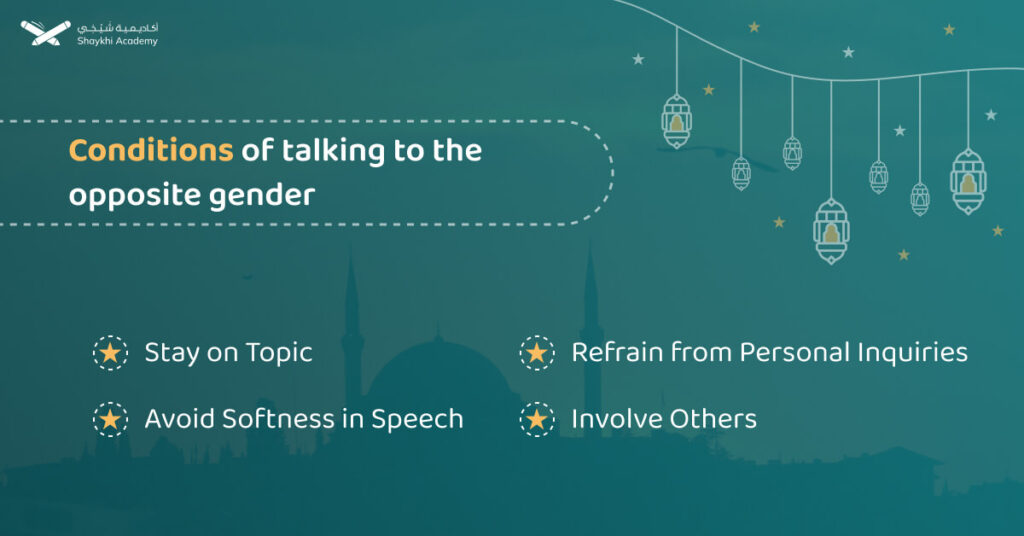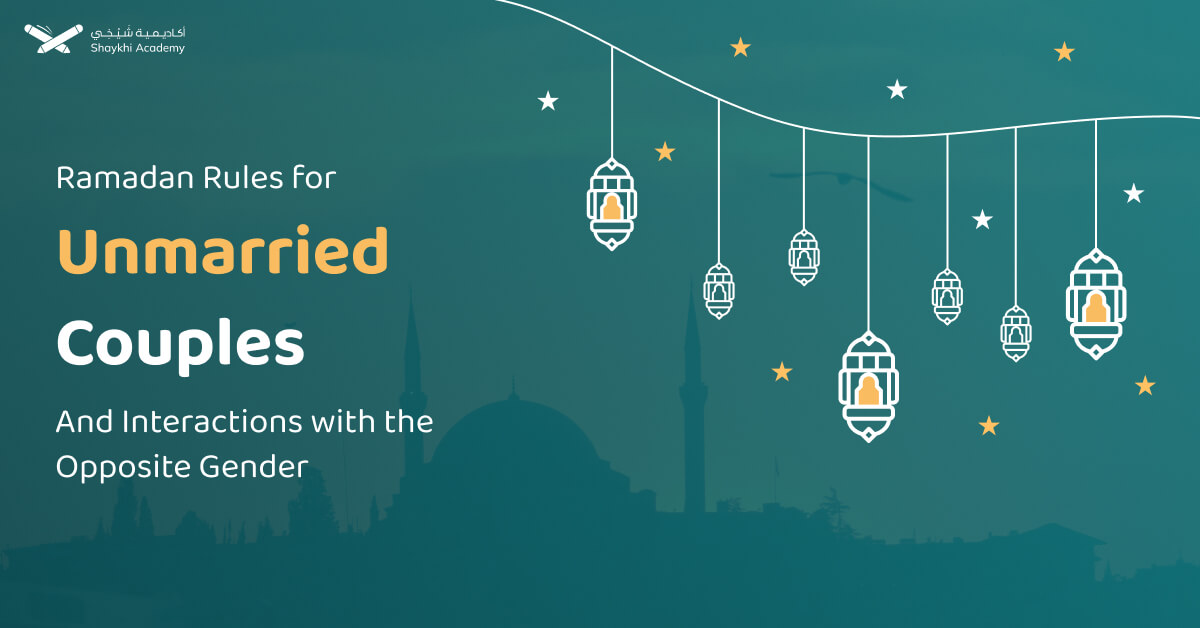In a nutshell, While Ramadan itself doesn’t prevent marriage, couples should be mindful of the challenges of fasting together. Romantic relationships outside of marriage are haram in Islam to uphold morals.
General conversations with the opposite gender are permissible during Ramadan, but with limitations to avoid temptation. Physical intimacy is never allowed for unmarried couples. The emphasis during Ramadan is on spiritual development, so if you have concerns about interacting with the opposite gender, it’s best to minimize those interactions to focus on your religious obligations.
Can you date during Ramadan?
No, dating is not permissible during Ramadan or at any time according to Islamic teachings. Islam emphasizes maintaining modesty, preserving chastity, and avoiding situations that could lead to temptation or sinful behavior. Relationships outside of marriage, such as dating, conflict with these principles.
Can You Kiss Your Girlfriend During Ramadan?
No, kissing your girlfriend is not permissible during Ramadan or at any other time in Islam, as physical intimacy outside marriage is prohibited. Ramadan emphasizes self-discipline and avoiding sinful actions, making it especially important to focus on spiritual growth and adherence to Islamic principles.
Can You Get Married During Ramadan?
Yes, you can get married during Ramadan. Getting married during Ramadan is perfectly permissible according to Islamic teachings. The holy month itself doesn’t impose any restrictions on holding a wedding ceremony. However, there’s a key factor to consider: fulfilling the requirements of fasting.
Since fasting during Ramadan involves abstaining from intimacy during daylight hours, some challenges might arise for a newly married couple. If there’s a concern that the excitement of starting married life could lead the couple to unintentionally break their fast, it might be wiser to postpone the wedding until after Ramadan. This way, they can fully concentrate on their spiritual obligations and avoid any potential complications that could come with navigating intimacy while fasting.
For Muslims considering starting married life during Ramadan, it’s crucial to assess one’s ability to refrain from intimacy during the fasting hours. Engaging in intercourse during Ramadan can result in severe consequences, including the obligation to make up for the missed fast and offer expiation. The expiation typically involves:
- Freeing a slave;
- if not possible, fasting for two consecutive months;
- and if that’s not feasible, feeding sixty poor persons.
If intercourse occurs on multiple days, the expiation must be repeated accordingly.
Considering the potential challenges and consequences, it’s advisable for those who fear they may not exercise sufficient self-control to delay their marriage until after Ramadan. Instead, individuals can focus on engaging in worship, reading the Quran, performing extra prayers (qiyam), and other acts of devotion during Ramadan to strengthen their spirituality and discipline.
Can You Have a Muslim Boyfriend During Ramadan?
No, having a boyfriend, whether Muslim or not, is not permissible in Islam during Ramadan or throughout the year. Such relationships conflict with Islamic teachings on modesty and the importance of maintaining proper boundaries between unmarried individuals. Instead, Muslims are encouraged to seek relationships through lawful marriage.
Can You Have a Girlfriend During Ramadan?
No, you cannot have a girlfriend during Ramadan and throughout the year. According to Islamic teachings, maintaining a girlfriend or boyfriend relationship is not permissible due to its conflict with principles of modesty and piety. Islam underscores the importance of preserving honor and lineage, which is jeopardized by engaging in illicit relationships. Proper boundaries must be maintained to avoid situations that may lead to temptation or sinful behavior, especially between individuals of the opposite gender.
Islamically, having a girlfriend or boyfriend is not permissible, as it goes against the teachings of the Quran and the Sunnah. The Prophet Muhammad (peace and blessings be upon him) warned against being alone with a non-mahram (someone whom one can marry), as it may lead to sinful behavior. Maintaining proper boundaries and avoiding situations that may lead to temptation is essential for observing the principles of Islam.
Therefore, forming close friendships with non-mahram individuals is haram. Instead, Muslims are encouraged to cultivate relationships based on respect and adherence to Islamic guidelines. This principle applies not only during Ramadan but throughout the year, as adhering to Islamic values is a fundamental aspect of one’s faith and conduct.
Can You Talk to Your Girlfriends During Ramadan?
No, you cannot. As we mentioned above, having a girlfriend is forbidden and not permissible during Ramadan and during the whole year, and certainly talking to a girlfriend is by extension forbidden and not permissible.
Islam emphasizes the preservation of lineage and honor. In Islam, interactions between unmarried individuals of the opposite gender should be conducted with modesty and respect to avoid temptation and sinful behavior. Scholars caution against engaging in conversations or correspondence that may lead to inappropriate feelings or actions, as even seemingly innocent interactions can escalate into sources of fitnah (temptation) and evil.
The purpose of fasting in Ramadan extends beyond abstaining from food and drink; it aims to cultivate piety and discipline. Engaging in inappropriate conversations with one’s girlfriend or any member of the opposite gender during Ramadan goes against the spirit of fasting and may hinder spiritual growth. Therefore, individuals are advised to focus on strengthening their relationship with Allah and observing the fast with sincerity and devotion, refraining from any interactions that may compromise their piety and adherence to Islamic values.
Can I Hug My Girlfriend During Ramadan?
No, absolutely no. In Islam, physical intimacy between unmarried individuals is not permissible at any time, including during Ramadan. The primary aim of Islamic teachings is to preserve lineage, honor, and protect individuals from engaging in illicit sexual relationships (zina). Therefore, actions that may lead to temptation or sinful behavior, such as hugging, kissing, or any form of physical contact, are strictly prohibited.
It is impermissible to engage in physical intimacy, including hugging, with a girlfriend during Ramadan or at any other time. Instead, individuals are encouraged to seek forgiveness for any past transgressions and to strive towards marriage, which is the proper framework for intimate relationships in Islam.
It’s crucial to understand that the sanctity of Ramadan heightens the prohibition of such actions. Muslims are encouraged to focus on spiritual purification and self-discipline during this sacred month, refraining from any behaviors that may compromise their fast or lead them away from the path of righteousness.

Can You Talk to the Opposite Gender in Ramadan?
You can talk to the opposite gender in Ramadan, but under conditions. In Islam, interactions between men and women are not inherently prohibited, but they must be conducted with modesty, respect, and adherence to Islamic guidelines. If a person feels confident in their ability to maintain proper boundaries and avoid temptation, limited and purposeful conversations may be permissible. However, certain conditions must be met:
- Stay on Topic: Conversations should remain focused on the intended purpose, such as discussing religious matters or addressing specific needs.
- Avoid Softness in Speech: Both parties should refrain from using soft or flirtatious language that could lead to inappropriate feelings or actions.
- Refrain from Personal Inquiries: Discussions should not delve into personal matters unrelated to the topic at hand to prevent unnecessary familiarity.
- Involve Others: Whenever possible, involve other individuals, such as friends or family members, in the conversation or correspondence to maintain accountability and discourage impropriety.
Ultimately, individuals must assess their own level of self-control and vulnerability to temptation. If there is any doubt or risk of falling into sinful behavior, it is best to avoid private interactions with non-mahram individuals altogether. Ramadan, with its emphasis on spiritual reflection and self-discipline, presents an opportune time to reassess one’s conduct and strive for greater adherence to Islamic principles in all aspects of life, including interactions with the opposite gender.
Ramadan: A Gateway to Your Quranic Destiny
This Ramadan, don’t just cleanse your body – nourish your soul. Shaykhi Academy is your portal to unlocking the secrets of the Quran, effortlessly and efficiently.
Busy adult? We get it. Our “Learn Quran Online for Adults” course bends to your schedule, not the other way around. Master essential recitation, Tajweed, and even memorization – all from the comfort of your couch.
Discover Our Range of Courses:
- Arabic Noorani Qaida: Lay a solid foundation for Quranic studies.
- Online Quran Classes for Kids: Engaging lessons for lifelong learning.
- Tajweed Rules for Kids: Learn to recite with confidence.
- Quran Hifz for Kids: Step-by-step guidance to memorize the Quran.
- Quran for Adults: Introduce yourself to Quran reading and Tajweed rules.
- Online Arabic Courses: Master the language of the Quran.
- Islamic Studies: A wide range of topics related to Islam, including theology, law, Quranic studies, Hadith.
Why Shaykhi Academy?
- Expert Guides: Certified native tutors become your personal Quranic mentors, dedicated to your success.
- Learn on Your Time: Overcome your busy schedule with flexible plans. Quran learning that fits your life, not the other way around.
- Financial Ease: Top-notch education doesn’t have to break the bank. Affordable fees with 2 FREE trial sessions to test the waters before you dive in.
- Always Supported: A dedicated team is always on hand 24/7 to answer questions and make sure your learning is seamless.
- Safe & Secure: Focus on learning, not worries. Our secure payment system keeps your personal information confidential.
This Ramadan, unlock your Quranic destiny. Join Shaykhi Academy and experience the difference. Book your FREE trial today and embark on a transformative journey that will enrich your life forever.

Conclusion
As Ramadan envelops believers in its spiritual embrace, it becomes essential to align one’s actions with the teachings of Islam, especially concerning interactions with the opposite gender. Upholding modesty, respect, and adherence to Islamic guidelines ensures that individuals navigate relationships and conversations with integrity and piety.
By embracing the values of discipline and righteousness, Muslims can maximize the blessings of Ramadan and draw closer to Allah while fostering healthy and respectful relationships within the bounds of Islamic principles.

















































